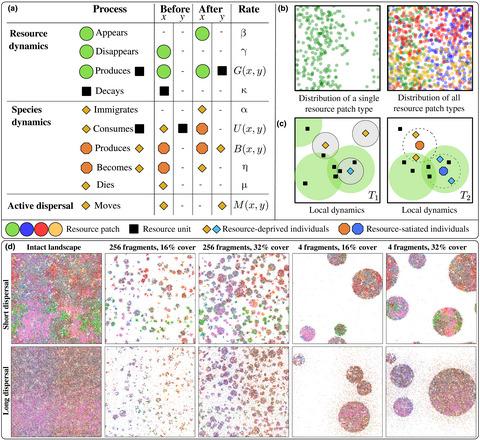当前位置:
X-MOL 学术
›
Ecol. Lett.
›
论文详情
Our official English website, www.x-mol.net, welcomes your
feedback! (Note: you will need to create a separate account there.)
Habitat fragmentation and species diversity in competitive communities
Ecology Letters ( IF 7.6 ) Pub Date : 2019-12-20 , DOI: 10.1111/ele.13450 Joel Rybicki 1 , Nerea Abrego 2 , Otso Ovaskainen 3
Ecology Letters ( IF 7.6 ) Pub Date : 2019-12-20 , DOI: 10.1111/ele.13450 Joel Rybicki 1 , Nerea Abrego 2 , Otso Ovaskainen 3
Affiliation

|
Habitat loss is one of the key drivers of the ongoing decline of biodiversity. However, ecologists still argue about how fragmentation of habitat (independent of habitat loss) affects species richness. The recently proposed habitat amount hypothesis posits that species richness only depends on the total amount of habitat in a local landscape. In contrast, empirical studies report contrasting patterns: some find positive and others negative effects of fragmentation per se on species richness. To explain this apparent disparity, we devise a stochastic, spatially explicit model of competitive species communities in heterogeneous habitats. The model shows that habitat loss and fragmentation have complex effects on species diversity in competitive communities. When the total amount of habitat is large, fragmentation per se tends to increase species diversity, but if the total amount of habitat is small, the situation is reversed: fragmentation per se decreases species diversity.
中文翻译:

竞争社区的生境破碎化和物种多样性
生境的丧失是生物多样性持续下降的主要驱动力之一。然而,生态学家仍在争论栖息地的碎片化(与栖息地的丧失无关)如何影响物种的丰富度。最近提出的栖息地数量假说认为,物种丰富度仅取决于当地景观中栖息地的总量。相反,实证研究报告了不同的模式:有些人发现碎片化本身有积极影响,而另一些人则有负面影响关于物种丰富度。为了解释这种明显的差异,我们设计了异质生境中竞争性物种群落的随机,空间明确模型。该模型表明,生境的丧失和破碎化对竞争性社区的物种多样性具有复杂的影响。当栖息地总数很大时,本身的碎片化往往会增加物种多样性,但是如果栖息地总数很小,则情况会相反:碎片化本身会降低物种多样性。
更新日期:2019-12-21
中文翻译:

竞争社区的生境破碎化和物种多样性
生境的丧失是生物多样性持续下降的主要驱动力之一。然而,生态学家仍在争论栖息地的碎片化(与栖息地的丧失无关)如何影响物种的丰富度。最近提出的栖息地数量假说认为,物种丰富度仅取决于当地景观中栖息地的总量。相反,实证研究报告了不同的模式:有些人发现碎片化本身有积极影响,而另一些人则有负面影响关于物种丰富度。为了解释这种明显的差异,我们设计了异质生境中竞争性物种群落的随机,空间明确模型。该模型表明,生境的丧失和破碎化对竞争性社区的物种多样性具有复杂的影响。当栖息地总数很大时,本身的碎片化往往会增加物种多样性,但是如果栖息地总数很小,则情况会相反:碎片化本身会降低物种多样性。











































 京公网安备 11010802027423号
京公网安备 11010802027423号